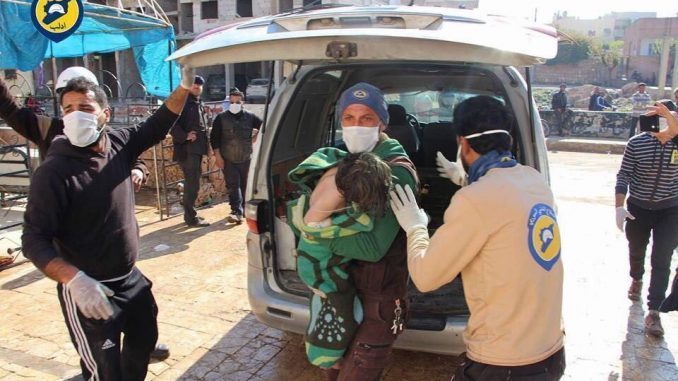
The US administration condemned the latest chemical attack by Assad regime against civilians in Syria, in which more than 60 civilian were killed, but said that their new policy in prioritizing the fight against ISIS over ousting Assad won’t be changed.
More than 60 civilians were killed in Syria in a new chemical attack carried out by Assad regime’s air force on the rebel-held Idlib province, doctors and monitoring groups have said.
The Syrian Observatory for Human Rights said the attack caused many people to choke or faint, and some had foam coming from their mouths, citing medical sources who described the symptoms as possible signs of a gas attack. All the children were under the age of eight.
The Edlib Media Centre (EMC), a pro-opposition group, posted images that were widely shared on social media, showing people being treated by medics and what appeared to be dead bodies, many of them children.
“This morning, at 6:30 a.m., warplanes targeted Khan Sheikhoun with gases, believed to be sarin and chlorine,” said Mounzer Khalil, head of Idlib’s health authority. The attack had killed more than 50 people and wounded 300, he said.
“Most of the hospitals in Idlib province are now overflowing with wounded people,” Khalil told a news conference in Idlib.
The air strikes that hit the town of Khan Sheikhoun, in the south of rebel-held Idlib, killed at least 58 people, said the Observatory.
Khan Sheikhun houses thousands of refugees from the nearby province of Hama who have fled the fighting there.
#Syria Chaos in front of #WhiteHelmets headquarter in Khan Sheikun #Idlib after airstrike Sarin toxic gas. pic.twitter.com/Ss5dlsZPWH
— Muhamed Al-khamis (@janatulnaeem02) April 4, 2017
Locals said the attack began in the early morning, when they heard planes in the sky followed by a series of loud explosions after which people very quickly began to show symptoms. They said they could not identify the planes. Both Syrian and Russian jets have bombed the area before.
Opposition activists and the AFP news agency, citing one of its journalists on the scene, later said a rocket had slammed into a hospital where the victims were being treated, bringing rubble down on medics as they struggled to deal with victims.
The civil defense, also known as the White Helmets – a rescue service that operates in opposition areas of Syria – said jets struck one of its centers in the area and the nearby medical point.
This attack is the deadliest chemical attack in Syria since sarin gas killed hundreds of civilians in the rebel-held Ghouta area near the capital in August 2013. Western states said the Assad regime was responsible for the 2013 attack but it denied the charge.
The casualties have been distributed across a wide range of hospitals in Idlib, with some sent north towards Turkey. There were reports that casualties driven to the Bab al-Hawa crossing on the Turkish border were experiencing difficulties in entering the country for emergency relief.
“The total number of wounded is incredible, so far it’s over 200,” said Mohammad, a doctor at another hospital in Idlib.
“We received over 20 victims and most of them are children, and two of them in the ICU are extremely critical. There are a lot of injured and most of these who were near the epicentre of the attack are either dead or in intensive care.
“The families are in a terrible state because they expect the victims to die.”
Mohammad said the victims he had seen had constricted irises, low oxygen and poor blood pressure and were drifting in and out of consciousness. Many were on respirators.
Civilian areas in Khan Shaykhun were targeted with poisonous gases this morning. Initial rprts of 50 killed incl wmn & chldrn, 300+ injured. pic.twitter.com/ZQ6MAgsqNO
— The White Helmets (@SyriaCivilDef) April 4, 2017
The US new policy in Syria
The attack came a day after the US ambassador to the UN, Nikki Haley, said the US government was no longer focused on Assad’s removal from office.
On Thursday, both Secretary of State Rex Tillerson and Nikki Haley, the U.S. ambassador to the United Nations, let it be known that the United States no longer seeks Assad’s ouster.
“You pick and choose your battles and when we’re looking at this, it’s about changing up priorities and our priority is no longer to sit there and focus on getting Assad out,” U.S. Ambassador Nikki Haley told a small group of reporters.
“Our priority is to really look at how do we get things done. Who do we need to work with to really make a difference for the people in Syria?” Haley said.
“Are we going to sit there and focus on getting him out? No.”
US Secretary of State Rex Tillerson backed Haley’s statement, saying that Assad’s future is up to the Syrian people to decide.
“I think the … longer-term status of President Assad will be decided by the Syrian people,” Tillerson said
Tillerson is due in Moscow next month for talks with Russian leaders, and Trump has long argued the powers should work together against ISIL.
White House spokesman Sean Spicer said that regarding Assad, “there is a political reality that we have to accept in terms of where we are right now.”
Read more: Global powers “condemn” Assad’s chemical massacre in Idlib
Disgraceful chapter in U.S. history
Sen. John McCain said Tuesday morning after the attack that Trump’s policy in Syria “is another disgraceful chapter in American history.”
McCain said the change in presidential administrations earlier this year has brought no change to what he sees as the deeply troubling U.S. stance toward Syria. “We’ve seen this movie before,” McCain said, recalling the “red line” drawn by former President Barack Obama and broken by Bashar al-Assad regarding the use of chemical weapons.
“Bashar Assad and his friends, that is, his friends, the Russians, take note of what Americans say,” McCain told CNN’s “New Day” on Tuesday. “I’m sure they are encouraged to know the United States is withdrawing and seeking some kind of a new arrangement with the Russians. And it is another disgraceful chapter in American history and it was predictable.”
“We stand for freedom, and we help people who are being persecuted and murdered. It does not mean we send the Marines,” he said. “It does mean there are many ways of assisting, including the court of public opinion. One of the things that won the cold war was Radio Free Europe. So we just seem to be without a message that has resonated for the last century.”
“Didn’t we learn a lesson when Barack Obama refused to do anything?” McCain said. “I mean, these are war crimes on the scale, almost unmatched since Nazi Germany or Pol Pot.”
Will the US correct its mistakes?
The United States blamed the Syrian government and its patrons, Russia and Iran, on Tuesday’s attack, as the White House called the attack a “reprehensible” act against innocent people “that cannot be ignored by the civilized world.”
A senior State Department official said the attack appeared to be a war crime and called on Russia and Iran to restrain Assad regime from carrying out further chemical strikes.
However, Sean Spicer, the White House spokesman, said the slaughter was unlikely to change the United States’ posture toward Assad because of the “political realities” in Syria.
“There is not a fundamental option of regime change as there has been in the past,” Spicer told reporters. “Somebody would be rather silly not acknowledging the political realities that exist in Syria. What we need to do is to fundamentally do what we can to empower the people of Syria to find a different way.”
He added that “these heinous actions by the Bashar al-Assad regime are a consequence of the last administration’s weakness and irresolution.”
“President Obama said in 2012 that he would establish ‘a red line’ against the use of chemical weapons and then did nothing,” Spicer said.
The raid in Khan Sheikhun indicates Assad’s growing confidence. He has wrested control of territory from the rebels, including the entire city of Aleppo, in recent months. His regime has benefited from the unflinching support of Moscow and Shia militias backed by Iran, as well as waning support for the opposition by its allies in the region and the new US administration.
The Syrian crisis began as a peaceful demonstration against the injustice in Syria. Assad regime used to fire power and violence against the civilians and led to armed resistance. 450.000 Syrians lost their lives in the past five years according to UN estimates, and more than 12 million have lost their homes.



